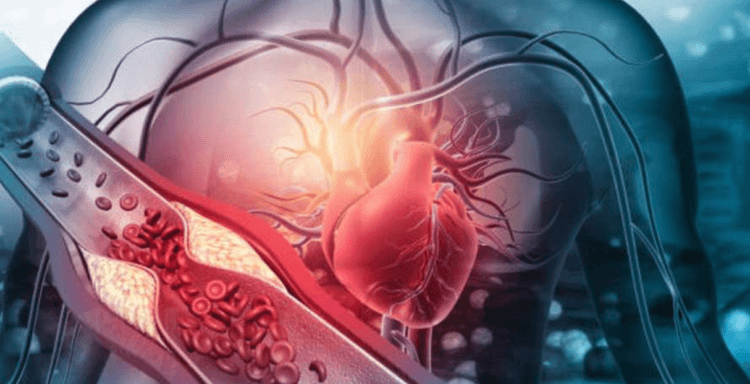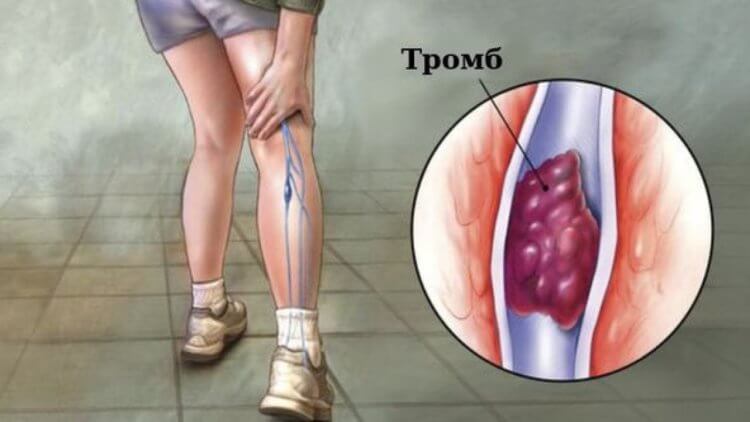A fairly common cause of death in people is “blood clot separation” — More than 10 million people die from this every year in the world. As a rule, this term refers to pulmonary embolism (PE), when the lumen of a large pulmonary vessel is blocked by one or even several blood clots. As a result, disturbances occur throughout the respiratory and cardiovascular systems. Typically, pulmonary embolism occurs as a complication of venous thrombosis and thrombophlebitis, that is, pathological conditions in which dense blood clots accumulate in the vessels. But not every broken blood clot leads to death.

The blood clot breaks off often leads to death
What is a blood clot breaking off< /h2>
Thrombi are collections of platelets “glued” together. They can attach to the vessel wall due to inflammation, microtrauma or atherosclerotic plaques. Blood clots can occur for various reasons — due to a sedentary lifestyle, dehydration, high sugar and cholesterol levels. In addition, there are a number of other factors, for example, previous surgery.
Most often, blood clots occur in large vessels, but they are not securely fixed to the walls. Due to biochemical or even mechanical influences, the blood clot can break away from the wall. In this case, it is picked up by the bloodstream and transported through the vessels. At some point, the blood clot clogs the vessel.

When a blood clot breaks off, a person often experiences pain in the chest
What does a person feel when a blood clot breaks off?
When a blood clot breaks off, a person suddenly turns pale, breaks out in sweat, and complains of pain in the back of the head and chest. With pulmonary embolism, acute shortness of breath suddenly occurs, and the person is bothered by sharp and frequent chest pain. Pressing and squeezing pain behind the sternum persists for more than 15 minutes. Pain may also appear in the left or both arms, the front of the neck and even the lower jaw.
At the same time, weakness appears, and the fear of death is also characteristic. Nausea and vomiting, severe coughing and hemoptysis may occur. Among other things, thromboembolism can lead to loss of consciousness. In severe situations, a person may begin to choke.
It should be noted that symptoms develop very quickly. In this case, the person requires immediate medical attention. Sometimes the detachment of a blood clot is preceded by thrombosis of the lower extremities. In this case, the person’s leg becomes very swollen or even turns blue.

The blood clot breaks off followed by thrombosis of the lower extremities
If you do not seek help in a timely manner , a person may die. But most often, death occurs with massive thromboembolism, that is, when not one, but many blood clots break off, which ultimately severely clog the pulmonary artery.
How to prevent a blood clot from breaking off
Preventing the occurrence of blood clots is much easier than saving a person after one of them breaks off. To do this, you need to regularly check and adjust blood sugar and cholesterol levels, as well as monitor clotting. If deviations from the norm are detected, timely treatment is required.
But that is not all. You should try to avoid long-term stress and trauma, eat healthy foods, be physically active, and drink enough water (avoid fast food, cholesterol-rich foods, sugary drinks, and other foods considered unhealthy). It should be noted that it is not at all necessary to exhaust yourself with long workouts in the gym. 30 minutes of walking a day is enough to reduce the risk of blood clots.

When a blood clot breaks off, a person requires immediate medical attention
The diet should include vegetarian food – berries, vegetables, fruits. You also need to eat fish. In addition, doctors pay special attention to fluid intake. You need to drink at least one and a half liters of clean water per day, that is, not counting tea, coffee, soups, drinks, etc. This is especially true for older people. The fact is that with age, people's sense of thirst often weakens, as a result of which they begin to drink less and experience dehydration.
Follow the link to our ZEN CHANNEL. We have prepared a lot of interesting, exciting materials dedicated to science for you.
Dehydration leads to thickening of the blood and, as a result, the formation of blood clots. Compliance with all of the above measures will allow you to avoid thrombosis and, accordingly, not encounter a blood clot.
Finally, let us remind you that another common cause of death in people is a heart attack, or myocardial infarction. We recently talked about how scientists can now predict a heart attack six months before the attack. Read more about this at the link.